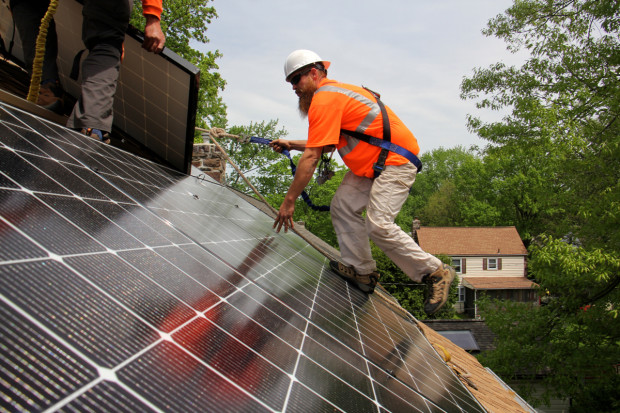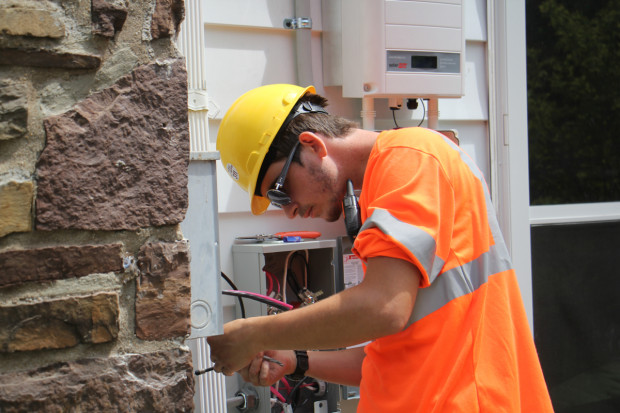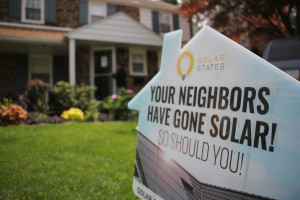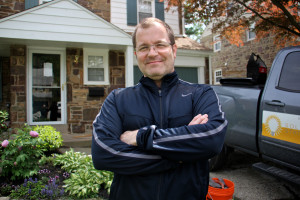Philadelphia aims to cash in on solar job boom
-
Susan Phillips

Emma Lee / WHYY
Dennis Hajnik installs solar panels on a roof in Bryn Mawr, Delaware County. Philadelphia has a plan to bring those panels to 500 city rooftops by the end of 2018, which it says will create 75 new jobs.
On a rooftop in Bryn Mawr, Delaware County, four men are working to install 18 solar panels on top of a four-bedroom house. They wear safety harnesses and helmets, lowering down one solar panel at a time onto metal frames. One is 21-year-old Thomas Glenn. Several years ago, Glenn dropped out of high school and was living with his parents in the Kensington section of North Philadelphia.
“You know, I was playing video games all day, listening to music,” Glenn said. “At the time I was waiting until I turned 18 so I would become a security guard or I was going to work at McDonalds.”
Glenn says solar helped turn his life around. After getting his G-E-D, he ended up in a training program for city youth, which led to this job with a small solar company.
“The money’s good, you get nice long hours and you’re doing something good,” he said.
He’s now living on his own, making $15 an hour. The more experienced crew members are making between $20 and $25 an hour.
With all the talk from President Trump about saving coal miners’ jobs, new employment in solar is actually growing. Pennsylvania saw a jump in solar jobs of 23 percent in 2016. A recent report from the Department of Energy shows solar jobs now outnumber coal jobs by more than two to one.
And while coal miners can make double what these solar installers are making, for someone like Glenn, with a high school diploma in a city like Philadelphia, $15 an hour is a pretty good starting wage.
Philadelphia has a plan to take advantage of this trend, and get young people without college degrees into the field. Recently, the nonprofit Philadelphia Energy Authority put out a request for proposals from solar companies to install panels on 500 rooftops in the city by the end of 2018, which it says will create 75 new jobs. It’s all part of the city’s larger effort to create 10,000 green jobs in the next ten years.

Emma Lee / WHYY
Thomas Glenn of Solar States completes the wiring for an array of solar roof panels on Nick DiPatri's home in Bryn Mawr. Glenn says he made a mistake by dropping out of high school. But now that he has his GED and this job, he says solar helped turn his life around.
Solarize Philly, as the plan is called, would take advantage of economies of scale, the more households sign up, the cheaper it is. And PEA wants to negotiate deals with equipment manufacturers to bring down the cost enough to allow moderate income homeowners to participate.
Emily Schapira is executive director of the Philadelphia Energy Authority, which has partnered with the city’s Office of Sustainability.
“We view our job as developing this market so these jobs are created,” Schapira said. “Keeping in mind these are living wage jobs.”
Solar energy accounts for about one percent of electricity generation in the U.S. But costs for residential and small business rooftop solar installations have dropped dramatically in the last five years. This is due in part, to cheaper solar cell imports from countries like China. So while solar cell manufacturing jobs in the U.S. are virtually non-existent, the installers have reaped the benefits of plunging costs.

Emma Lee / WHYY
A home in Bryn Mawr goes solar. Costs to install solar panels have dropped dramatically in the last five years. Solar market analysts say they expect those prices to continue dropping.
“The reasons for this is that mainly the costs of the equipment has come down very very dramatically in the last five years,” said Ethan Zindler, a solar market analyst with Bloomberg New Energy Finance. “Five years ago, it used to cost $3.00 per watt, it’s now as little as 40 cents per watt and we think it’s going to get lower than that. It’s becoming more economical to consumers.”
When I first heard about the push to create 10,000 green jobs, I was dubious. The bulk of the jobs would come doing energy efficiency upgrades on small businesses and public school buildings, not solar.
But talk to solar installers these days, and they’re bullish on the sun’s energy. Micah Gold-Markel is Glenn’s boss and the founder of Solar States, one of dozens of small solar installers working in the region.
“Absolutely, if we make the type of commitment to solar that we should, it’s easy,” said Gold-Markel.
Standing on the rooftop deck of the Free Library of Philadelphia, at the roll out of Solarize Philly, Gold-Markel said his business has doubled in both revenue and employees in the last three years.
“Look at the all roof tops,” he said. “There’s so many out there that could take solar, that’s our opportunity.”
Right now Gold-Markel employs 23 people and most of his business is in New Jersey, where the state has stronger incentives for rooftop solar. But he’s also got business in the Philadelphia suburbs and he expects it to double again next year.
“It’s huge, we’ve grown 100 percent the last three years running. I don’t know if we can keep that up it’s causing me to get a lot of gray hair,” he said, laughing.
It’s not been easy for city residents to install solar panels. The Energy Authority’s Schapira said the city bureaucracy, mainly the Department of License and Inspections, wasn’t granting permits. And she says PECO, the utility that provides electricity for Philadelphia and its suburbs, had also been taking a long time approving solar installations. But she says the city’s Office of Sustainability has been working with L&I and environmentalists have been putting the pressure on PECO.
PECO says the number of households wanting to install rooftop solar more than tripled between 2015 and 2016. In fact, the power company has created a new department, and says it will hire 12 people just to keep up with the new requests.

Nick DiPatri has solar panels installed on the roof of his Bryn Mawr home. He says even without the "hippie" motivations, it's now a good investment.
Nick DiPatri owns the home in Delaware County where Glenn and his coworkers worked recently installing solar panels. DiPatri says the election of Donald Trump motivated him and his wife to go solar. He disagrees with the current administration’s promotion of fossil fuels and he and his wife want to help the environment.
“But even if you forget all those hippie motivations, it’s a pretty good money move right now,” he said.
It’s still not cheap. DiPatri paid more than $18,000 dollars upfront for installation, but he says he’ll get some of that back through a federal income tax credit. And he says from what he saves by not buying electricity, the solar panels will pay for themselves in nine years because he can sell extra energy back to the grid.
“So during the day when you’re producing the most electricity, you’re actually not using all of it,” he said. “So what it does, there’s a little box inside the house it redirects the energy back out onto the wires and it literally drives my neighbor’s houses. It’s like my house is the battery for the block.”
The tax credits the DiPatri is taking advantage of with his solar installation are set to expire in about four years. But solar market experts like Bloomberg’s Ethan Zindler say they expect the costs to keep dropping, to the point where policy incentives like federal tax credits will no longer be a factor for homeowners considering solar.
“This industry is becoming less and less driven by policy every day and more and more driven by economics,” said Zindler. “So the more the costs decline, the less it’s going to matter whether a tax credit changes. We’re at a point where… solar is becoming more economically competitive regardless of policy.”
And that, he says, is good news for solar job workers.
Down off the roof and on his lunch break, Thomas Glenn says at first it was scary working on top of houses.
“We develop something we call roof legs,” he said. “And walking on the roof is just like walking on the ground to us now.”
Glenn says he expects to be working in solar for a long time, maybe even starting his own company one day. After all, right now, only about 34,000 rooftops in Pennsylvania have solar. There are a lot of empty rooftops out there.
















